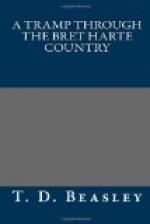Yet as before stated, when once I got fairly started on the road, the pioneers themselves and their worthy descendants absorbed my interest and assumed the center of the stage to the exclusion, for the time being, of the romancers; who, after all, each in his own fashion, depicted only what most appealed to him in the characters of these same men and their contemporaries. Bayard Taylor in his interesting work “El Dorado,” the first edition of which appeared in 1850, thus states his opinion of the men of ’49:
“Abundance of gold does not always beget, as moralists tell us, a grasping and avaricious spirit. The principles of hospitality were as faithfully observed in the rude tents of the diggers, as they could be by the thrifty farmers of the North and West. The cosmopolitan cast of character in California, resulting in the commingling of so many races, and the primitive mode of life, gave a character of good-fellowship to all its members; and in no part of the world have I ever seen help more freely given to the needy, or more ready co-operation in any human proposition. Personally, I can safely say that I never met with such unvarying kindness from comparative strangers.”
That last sentence also spelt the literal truth in my experience. Even the dogs were kindly disposed and though I carried, a “big stick,” except by way of companionship and as an aid in climbing, I might safely have left it at home. And while at times I walked through a wild, mountainous and almost deserted country, the idea of possible danger never occurred to me. When finally one encountered a human being, he invariably proved a courteous, obliging and companionable personage to meet.
Bayard Taylor attended in September and the beginning of October, 1849, the convention at Monterey, which gave to California its first, and in the opinion of many, its best constitution. He closes his review of the proceedings with these forceful and prophetic words:
“Thus we have another splendid example of the ease and security with which people can be educated to govern themselves. From that chaos whence under, a despotism like the Austrian, would spring the most frightful excesses of anarchy and crime, a population of freemen peacefully and quietly develops the highest form of civil order — the broadest extent of liberty and security. Governments, bad and corrupt as many of them are, and imperfect as they all must necessarily be, nevertheless at times exhibit scenes of true moral sublimity. What I have today witnessed has so, impressed me; and were I a believer in omens, I would augur from the tranquil beauty of the evening — from the clear sky and the lovely sunset hues on the waters of the bay — more than all, from the joyous expression of every face I see, a glorious and prosperous career for the State of California.”




